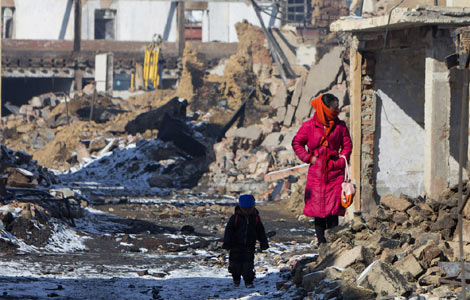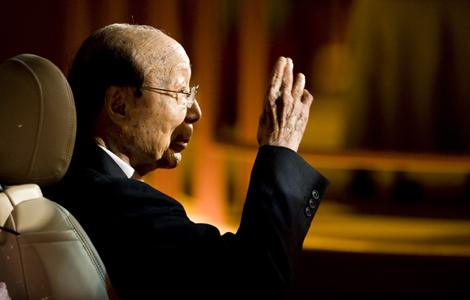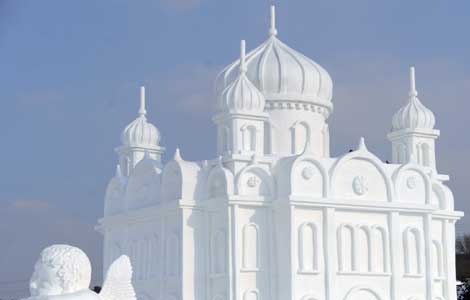Obama set to speak about NSA activity
Updated: 2014-01-17 00:15
(Agencies)
|
|||||||||||
After months of gushing intelligence leaks and warnings that US national security has gone rogue, US President Barack Obama was scheduled to finally give his response to Edward Snowden on Friday.
In a long-awaited speech, Obama will propose curbs on ravenous worldwide US National Security Agency phone and Internet data dragnets, exposed by the fugitive intelligence contractor.
The event will mark Obama's latest attempt to remold the national security apparatus born in the fearful months after the 9/11 attacks and cemented by a decade of terror wars.
Obama is also expected to back extra privacy protection for foreigners swept up by the programs and limits on spying on friendly world leaders.
His challenge will be to prove that data mining programs, made possible by swift advances in technology, can enhance national security while restoring public confidence that individual freedoms are safe.
Neil Richards, a professor of law at Washington University, St Louis, said, "I think what we are likely to see is less reform than civil libertarians would like, and more of a reform than the security services would like."
Obama's statement, in effect, will be a repudiation of Snowden, who warned in a Christmas message from exile in Russia that governments had "created a system of worldwide surveillance, watching everything we do".
The White House spin machine has set expectations for modest but meaningful reforms, trying to balance the horror at NSA sweeps provoked among US allies and civil liberties advocates with resistance to change from US spy agencies.
"When you think about it, we're really having a debate about what is Americans' fundamental relationship with their own government," said Senator Patrick Leahy, who backs more restrictions on surveillance.
Obama's speech follows a comprehensive White House policy review, consultations with security agencies, transparency campaigners and telecommunications firms, and prolonged personal soul-searching.
He has had to reconcile his duties as a commander-in-chief sworn to keep Americans safe and his oath to uphold the US Constitution.
Yet on his political flank, Obama knows his Republican enemies would pounce if a future terror attack could be pinned on restrictions he placed on spy agency activity.
Pressure from the left, which helped elect him as an anti-war candidate in 2008, is also intense.
"President Obama's speech on Friday will not only determine the direction of national security policies and programs, but also define his civil liberties legacy," said Anthony Romero, executive director of the American Civil Liberties Union.
The White House has signaled the president has considered requiring a third party to retain records on the duration and destination of nearly all phone calls by Americans captured in NSA collection.
Currently the secretive agency holds the data for five years. However, US telecommunications firms, compelled to hand over such data by law, have made clear they do not want the job.
Some legal experts believe Obama may choose to limit the amount of time call data can be held. He may also curb the scope of NSA power to exploit the data.
Currently, US spies can access call records three "hops" away from a terror suspect. Obama may limit that to two "hops".
The idea of taking the responsibility for data storage away from the NSA was endorsed by a Review Board report commissioned by Obama, which came up with 40 recommendations for reform.
But the group did not recommend an end to the program. In fact, one member, former deputy CIA director Michael Morell, said the program could have prevented 9/11 had it been in place in 2001.
Related Stories
Obama ponders limiting NSA access to phone records 2014-01-10 06:16
Obama to consult intel leaders, Congress on NSA review 2014-01-08 10:31
NSA seeks computer to break encryption 2014-01-04 07:22
NSA spying 2014-01-06 07:38
German magazine reveals NSA hacking tactics 2013-12-30 11:02
US judge upholds NSA phone surveillance program 2013-12-28 01:23
Today's Top News
Russia battle militants before Olympics
Hollande responds to affairs reports
China and Italy agree to boost cooperation
Party school official suspended after scandal
China Mobile and Apple 'tie the knot'
Nation's airlines ready for rush
UK dumps China's telecom equipment
At least 16 dead in E China factory fire
Hot Topics
Lunar probe , China growth forecasts, Emission rules get tougher, China seen through 'colored lens', International board,
Editor's Picks

|

|

|

|

|

|





